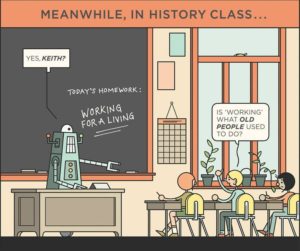
The prognosis of technology replacing jobs where AI can more effectively do jobs currently assigned to humans has drawn fears that tomorrow’s world will be increasingly jobless. To mitigate these issues, competing proposals have arisen to resolve the societal fallout of a jobless world. One in Universal Basic Income (UBI) promoted by many from Democratic presidential hopeful Andrew Yang to tech billionaire Elon Musk. It regular cash payments made to a given population with minimal or no requirements for receiving the money, in order to increase people’s income. It was trialled in Finland recently from January 2017 to December 2018, where 2,000 unemployed people in Finland received an unconditional monthly payment of €560 ($634) instead of their usual unemployment benefit. The results were mixed, and not quite the solution people were expecting.

The other solution is a Job Guarantee. A job guarantee (JG) is an economic policy proposal aimed at providing a sustainable solution to the dual problems of inflation and unemployment. Its aim is to create full employment and price stability, by having the state promise to hire unemployed workers as an employer of last resort.
This article is not about exploring the details of a job guarantee but explaining why the neo-liberal solution of UBI is a poorer solution to resolving any future malaise in employment issues we may yet encounter. To this end, I have compiled ten reasons why I have found a UBI to be wanting.
1. There are no inflation controls in a UBI whereas a JG is counter-cyclical by design, making it extremely useful for preventing problematic deflation and inflation. As such, a UBI is intrinsically inflationary. It does not increase productive productivity the way JG does. Prices will inevitably rise in response to the increase in wealth in the economy. By increasing the number of dollars with no corresponding increase in the supply of goods and services (that a more productivity aligned policy does), the economy has only one recourse; inflation!
2. UBI does not engage people for job readiness and can facilitate long term unemployment and ultimately unemployability. A UBI establishes a structural under-class that is reliant on the goodwill of a government in much the same way as people on NewStart have relied on the goodwill of successive governments. Look out how that is turning out. It abrogates the responsibility of a central government to provide real full employment. There are significant inequity issues with a UBI, because why should it be ‘universal’? Instead, one should drop the “U” as for those who cannot work, a BI without all the hurdles and qualifiers would help some of the poorest and most disadvantaged, without being inflationary. It makes more sense to provide anyone who cannot work – for whatever reason – with a decent and liveable basic income and invest in a full-blown JG. What is better than a UBI, would be a DBI (Dignified Basic Income) as it is fundamentally important to remind all Aussies that whoever cannot work, that they deserve a DBI. Taken further, a DBI is mostly a reasonable and equitable welfare system. Most certainly, the income should not be universal!
3. A UBI reinforces neoliberal narratives about accepting structural unemployment, accepting underemployment and provides a flawed definition of full employment that agrees with a “natural” rate of unemployment, as such UBI is still neo-liberal. Presuming a UBI is not enabling people to live in luxury, like people on welfare, the money received is spent for survival in the economy. While it would achieve increasing economic demand, which would be useful to the economy, the beneficiaries may not be small businesses. Given the extent of corporate capitalism, it is still a pool via which the government transfers money via the public to the wealthy enterprises that supply goods and services (especially when retail is as depressed as it is at the moment). (I will expand on that in the next point) As such, a neo-liberal government is provided with the excuse to reduce tailored welfare further. Not useful where the UBI is insufficient to aid costly medical assistance or disadvantaged households (single mothers, etc.). A UBI would replace most cash benefits for working-age families, although directed to individuals and not tailored to a household’s needs.
4. A UBI does nothing to force the private sector to improve wages for what jobs that do exist the way the JG forces the private sector to compete for workers on price. In fact, a UBI acts as a government subsidy for private business. Companies wouldn’t necessarily need to pay as much in wages because workers would be already receiving a “basic income” from the government. Employers can use that as an excuse to deflate the salaries of workers. Wage stagnation is already a problem in most western countries where wages and productivity gains have long parted company. Providing corporates driven by neoliberal ideology, more excuses to reduce payments to workers is undesirable. A UBI will likely accelerate the Uberization of jobs since it represents a significant subsidy to firms. Employers would have no motivation to offer a living wage if the government provides a UBI.
5. A UBI does not necessarily reduce poverty and not merely because inflationary rises would reduce the spending power of money provided. It would also affect the taxation thresholds of the receivers of income, shifting people into higher brackets. Which brings attention to the realisation that a UBI accounts for neither one’s starting point or one’s needs. Specific individuals will undoubtedly cope adequately receiving an income of say $1000 a month. But in the case of the disabled or chronically ill, mentally or physically disadvantaged this may be insufficient. UBI does nothing to encourage disabled workers to enter the workforce. Unemployment rates of people with Downs syndrome are in the region of 80%+. Their circumstances may be such that their poverty has no relief, in the same manner, an individually without impairments would find it a boom to their lifestyle. A UBI is unlikely to provide long term with subsistence, not while a poverty buffer stock (i.e. a scheme to use commodity storage to stabilise prices in an economy) is used in capitalist economies. The OECD’s analysis of Basic Income is worth reviewing because it is a nuanced examination, and it looks at the countries that have tried it. The results have not been as fabulous as the proponents of UBI might have hoped.
6. A UBI treats people only as consumption units (reminiscent of neo-liberal perspectives), whereas JG provides dignity and meaning to those not currently wanted by the private sector. The consequence is that a UBI is discriminatory as it divides society based on earned/provided income. This is already exhibited by the name-calling of people on unemployment benefits as “dole bludgers” or “NEATS”, etc. even though the economy as is, doesn’t have sufficient job vacancies to cater for the unemployed numbers let alone the underemployed. A JG can widen our society’s imagination of what counts as a paid job and alleviate the discrimination that a UBI cannot.
7. A UBI is unconditional as it is paid without a requirement to work or to demonstrate willingness-to-work. JG generates productive work out of tasks that are typically performed by volunteers (or left undone). JG is more likely to develop structurally effective methods to perform tasks (as well as paying people to do them). The unconditionally benefits of such a UBI grant is that it empowers the recipients to refuse poorly funded or dysfunctional jobs. These poor job conditions, in turn, may more likely facilitate a mass exodus from precarious working conditions. The consequence would be a further drop in productivity in the economy and an exacerbated inflationary effect beyond what I discussed in point 1.
8. There are psychological advantages to being actively engaged in a Job Guarantee providing federally funded but locally administered community jobs suited to the skills and preferences of those involved. These benefits include people’s mental health and well being. Personally fulfilling and socially valued paid work provides psycho-social benefits that a UBI cannot. Being left to one’s resources with a small pool of money allows for better survival but still facilitates the social disconnect that leads to drug and alcohol abuse. The daily engagement in a workplace alleviates these issues and provides a greater sense of self-worth which a UBI does not.
9. Work is what we do for other people, and hobbies are what we do for ourselves. Financing a hobby with UBI promotes self-indulgence but does not necessarily compensate people adequately for their contribution to their community. This might only be the case where the UBI does elevate significant numbers above the poverty line. Realistically, a high-value UBI that lifts everyone above the poverty-line is unlikely to occur. A UBI may produce useful volunteering where people have a secure financial base with which to start. Unfortunately, it will do little to assist people unable to engage with the private sector for reason of physical or psychological impairment. A job guarantee can still engage the disadvantaged in employment as is illustrated by social enterprises currently in existence such as Anglicare, Big Issue, Endeavour packing, etc. A UBI’s capacity to assist socially gregarious people in engaging in useful community tasks in an economically realistic fashion will depend on their ability, stability (financial and otherwise) and their willingness. Having all these factors align such that UBI serves a social good is likely to be more limited than it is normalised.
10. A UBI establishes a structural under-class that is reliant on the goodwill of a government in much the same way as people on NewStart have relied on the goodwill of successive governments. Look out how that is turning out. It abrogates the responsibility of a central government to provide real full employment. There is very little a UBI does to address inequity issues, either socially and financially – given its limited capacity to grow productivity, – its inflationary consequences and the inevitable social ostracisation. It makes more sense to provide anyone who cannot work – for whatever reason – with a decent and liveable basic income and invest in a full-blown JG.
While not wanting – in this article – to go significantly into all the aspects of a Job Guarantee, to wrap up on the UBI and to provide some counterpoint I will mention three advantages specific to a Job Guarantee that is immediately relevant.
1. Provided the JG is locally driven, based on identified local needs, it contributes to community cohesiveness. Relevant to the discussion, I noted, was expressed in the meeting on support for rural communities.
2. JG provides a more effective inflation anchor.
3. JG optimises the productive capacity of the labour market, which has a whole raft of positive socio-economic spin-offs.
Many associates with whom I hold in high regard, have promoted with excitement the opportunities of implementing a UBI as a solution to the poverty of Newstart and poor welfare solutions offered by the government. I understand the motives are based on progressive agendas that are seeking a seeking to redress poverty and lift people up the lowest class rungs of society. I applaud the motives and the commitment to the greater social good. I certainly support increasing Newstart allowance and social welfare payments and reducing the enormous subsidisation of the wealthy while generating a more robust employment market, but I do not hold that a UBI is the means by which these goals can be safely achieved.